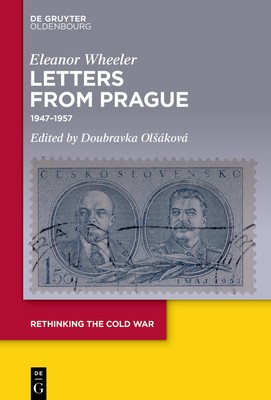
- We will send in 10–14 business days.
- Author: Eleanor Wheeler
- Publisher: Walter de Gruyter
- Year: 2022
- Pages: 450
- ISBN-10: 3110690403
- ISBN-13: 9783110690408
- Format: 15.6 x 23.4 x 2.7 cm, hardcover
- Language: English
- SAVE -10% with code: EXTRA
Reviews
Description
Eleanor M. Wheeler, a correspondent for the Religious News Service, wrote letters from Prague to her friends in the USA from 1947 to 1957. Her husband, George Shaw Wheeler, was a colonel in the US Army and the chief of the de-Nazification section of the Manpower Division of the Office of the Military Government (OMGUS). While in Germany in 1946, Wheeler's contract was not renewed, mainly due to suspicions that he was disloyal to the US government and had connections to the communist movement. Afterwards the entire family moved to Prague, where in 1951 they applied for political asylum.
The correspondence depicts ten years of life in Czechoslovakia--from the rise of communism through high Stalinism to the de-Stalinization of the country--from the perspective of pro-Communist-minded Americans. Thematically, the correspondence covers a wide range of political, cultural, and social topics, including the Cold War, the Korean War, the role of Christians in mediating dialogue between East and West, McCarthyism, and topics focused on the internal politics of Czechoslovakia.
EXTRA 10 % discount with code: EXTRA
The promotion ends in 15d.07:36:25
The discount code is valid when purchasing from 10 €. Discounts do not stack.
- Author: Eleanor Wheeler
- Publisher: Walter de Gruyter
- Year: 2022
- Pages: 450
- ISBN-10: 3110690403
- ISBN-13: 9783110690408
- Format: 15.6 x 23.4 x 2.7 cm, hardcover
- Language: English English
Eleanor M. Wheeler, a correspondent for the Religious News Service, wrote letters from Prague to her friends in the USA from 1947 to 1957. Her husband, George Shaw Wheeler, was a colonel in the US Army and the chief of the de-Nazification section of the Manpower Division of the Office of the Military Government (OMGUS). While in Germany in 1946, Wheeler's contract was not renewed, mainly due to suspicions that he was disloyal to the US government and had connections to the communist movement. Afterwards the entire family moved to Prague, where in 1951 they applied for political asylum.
The correspondence depicts ten years of life in Czechoslovakia--from the rise of communism through high Stalinism to the de-Stalinization of the country--from the perspective of pro-Communist-minded Americans. Thematically, the correspondence covers a wide range of political, cultural, and social topics, including the Cold War, the Korean War, the role of Christians in mediating dialogue between East and West, McCarthyism, and topics focused on the internal politics of Czechoslovakia.


Reviews